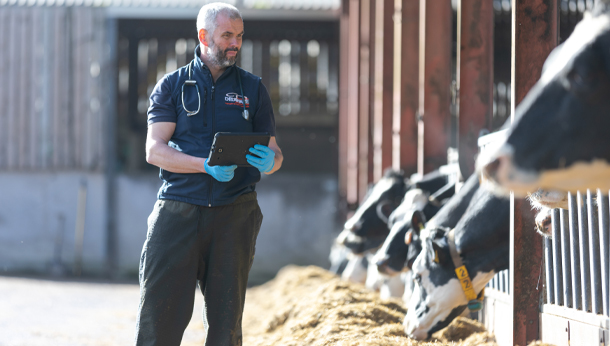
What is Leptospirosis?
Causing abortion, decreased fertility and a drop in milk production, Leptospirosis is a nasty bacterial disease.
It is passed around a herd by direct contact with infected and recovered ‘carrier’ animals through:
- Urine
- Reproductive secretions
- Milk from acutely affected animals
- Contaminated water
- Via other species like sheep
It can also be passed onto humans, making it a zoonotic disease. In humans, it causes flu-like symptoms with headaches and a fever, sometimes progressing to meningitis.
During primary infection, and generally before the disease has even been noticed in the herd, animals shed leptospires in high volume in their urine, milk and foetal fluids. This shedding can continue for several weeks. Animals who have had lepto, but have recovered, can continue to be an issue by becoming renal carriers and shedding leptospires in their urine.
If you are concerned about leptospirosis or whether you may have ‘carrier’ animals, give us a call.
The Symptoms
After the first phase of Leptospira infection in cattle, the bacteria gather in the urogenital tract. Early symptoms are usually mild and short-lived and this can mean they are often not noticed.
In cows, the first symptom is often a sudden decrease in milk yield. Abortions usually occur 6-12 weeks after the initial infection. If the infection occurs in the late gestation, an infected calf may be born.
Abortion rates range from up to 30% in herds not previously infected to 5% in herds where Leptospirosis is endemic.
The greatest effects of infection on fertility are low pregnancy rates and increased culling due to low fertility.
How these symptoms manifest varies, depending on the infection status of the herd. In a chronic inactive state of infection, there are very few signs of poor fertility. During initial infection of the herd, or an inactive state that becomes active, the symptoms are more visible.
A natural immunity is established in a herd after the initial infection phase. All new animals that enter the herd are susceptible, however, and suffer from an acute infection with the associated symptoms. This is also the case with animals that were not with the infected herd during the initial infection but joined later (e.g. dry cows).
Diagnosis
Diagnosis needs to be confirmed by lab tests. However, diagnosis of leptospiral abortion is difficult and based on maternal and foetal blood tests. There are no outwardly obvious signs associated with the infection.
Isolation of Leptospires from blood, cerebrospinal fluid and milk can be attempted in acute cases. Cultures from urine samples can also be made from clinically infected or suspected carrier animals. The bacteria can also be isolated from organs of animals that died during the acute phase of disease. Samples need to be kept chilled and reach the laboratory within 3 hours.
Other laboratory methods such as fluorescent antibody tests and dark field examination of blood and urine samples to detect live bacteria may also be useful for a definitive disease diagnosis.
In most farms, due to the level of pathogens, it is not economically feasible to test and cull all the animals. Unfortunately, blood tests are an unreliable indicator of infection status. All aborting animals or acutely infected animals should be isolated. Acutely infected animals can be treated with antibiotics such as dihydrostreptomycin.
Biosecurity and Vaccines
Maintaining biosecurity involves avoiding the introduction of infected animals into the herd and/or implementing strict isolation/quarantine of introductions until they are proven negative. Restricting access of livestock to external sources of infection e.g. double fencing is in place at all perimeters, prohibiting access to open waterways, etc., is always a good idea.
The best way to make sure your herd is Lepto-free is with vaccination. Give us a call so we can discuss the status of your herd and include this vaccine in your herd health plan.